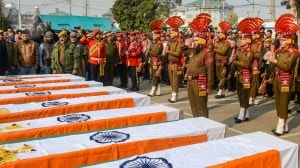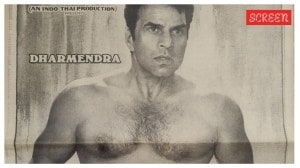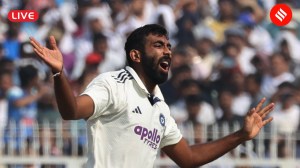Controversy’s Messenger
Controversy and Islamic televangelist Dr Zakir Naik are no strangers.
Controversy and Islamic televangelist Dr Zakir Naik are no strangers. In fact,the medical doctor-turned-preacher who has millions of followers around the world,thinks its natural. When people become popular,when they have a mass following,they are bound to attract people who disagree with them and end up creating a controversy,he believes. Yet,when the new,Conservative British government revoked his visa last week and barred him from entering Britain for his unacceptable behaviour,it pitchforked the bespectacled,44-year-old Mumbaikar from the narrow side-alleys of the financial capitals Muslim quarters to the centre of yet another international debate over Islam,politics and terror.
Londons decision came on the heels of a report in the British newspaper,The Sunday Times,which said the Preacher of hate is let into Britain. The report said that Naiks case was the first major test of the Tories election pledge to keep radicals out of the country as the Mumbai man was a misogynist Islamist who supports terrorism. Naik and his followers recoiled in horror at the allegations,blamed it on politics and Islamophobia and have started the process to challenge the move in a British high court. Canada,where Naik was to travel from Britain,too followed suit and revoked his visa. While previous controversies involving him were mostly intra-communal and limited in their reach,this transcontinental conflagration has forced scholars and commentators to sit up and revisit the Naik phenomena.
With the spotlight clearly on Naik,questions are being asked about the reason for his popularity and the growth of his religious empire,even as some of his controversial statements are being cited and interpreted by supporters and critics to paint him as a saint or a sinner. Those who have tracked Naik over the years attribute his rise to the fact that he is the only such evangelist from this part of the world who preaches in English,wears a jacket and tie,and addresses the angst of sections of the community which is half-knowledgeable about its faith and has particularly felt beseeched in the last decade.
He is certainly very popular among a section of the people because of his polemical approach,because he seems to be defending his faith,establishing the supremacy of his faith, says Prof Akhtarul Wasey,Head of the Department of Islamic Studies at Jamia Millia Islamia University. When it seems like Islam is under attack from so many quarters and you find a person who is defending it and championing its cause,he ends up becoming a hero.
Naik,who is anything but modest about his popularity,describes himself as a promoter of Islam and a messenger of peace,someone who has a scientific mind and clears misconceptions about Islam with reason and logic.
Naiks power comes from his forceful and often rhetorical speech. And the fact that he can quote the Quran,chapter and verse,in every second sentence to justify a particular line of reasoning. He is more fluent in English and Arabic than Hindi or Urdu,is well-versed with comparative religions,and loves a good argument. All of this comes together to create the persona of an enigmatic evangelist in sharp contrast to the image of the hate-spewing mad mullah large sections of the non-Islamic world love to hate.
Critics,both at home and abroad,however,say that Naiks appearance and style are mere masks for the radical inside. They allege that he has been funded and propped up by the hardline Wahabi sect of Saudi Arabia,uses the polemical approach to claim supremacy for Islam and subtly promote terrorism and is a male chauvinist,among others.
One of the two oft-cited Naikisms by his critics are his views about Osama bin Laden and terrorism. According to the gist of the several variations of his comments that have travelled around the world,Naik is supposed to have said that every Muslim should be a terrorist against anti-social elements,and that peoples actions should be labelled only after analysing the cause. Secondly,Naik is reported to have said that he is not sure if bin Laden is a saint or a terrorist,if he is truly behind the 9/11 attacks in the United States and if bin Laden is fighting America the terrorist,then Naik thinks bin Laden is following Islam.
These comments,along with reports that say three high-profile terror suspectsAfghan-American Najibulla Zazi who was arrested last year for plotting to bomb the New York subway,Bangalores Dr Kafeel Ahmed who stormed Glasgow airport in an explosives-laden car,and Mumbais Rahil Sheikh arrested for the 7/11 serial train blastswere fans of Naiks preaching,have managed to raise questions about Naiks real intentions. Although security agencies say there is nothing to link Naik to these men or any other suspicious activity,he is on their radar and is monitored due to his provocative remarks.
Naik rejects these allegations and calls them calculated mischief aimed at defaming him. I have spoken out on numerous occasions against all and any acts of terrorism and have unequivocally condemned acts of violence,including 9/11,7/7 and 7/11 incidents. I have said on several occasions that these are cowardly acts and completely unjustifiable by any standards, he says. However,he says that he is not yet ready to believe bin Laden was responsible for 9/11. He says there have been reports questioning the blame on bin Laden and al Qaeda which also say that the attacks were an inside job by war mongers in the White House who wanted an excuse to invade oil rich nations. You have a right to your opinion,I have a right to my opinion. But the evidence I have seen,I feel the other is more logical,more scientific, he says,referring to the contrarian 9/11 theory. But yet,even after believing that that is more logical,more scientific,I say I dont know.
The other controversial remarks by Naik that frequently spark a furore are those related to his reported views about women. For instance,Naik is reported to have said that women who wear skimpy clothes invite the attention of anti-social men and possibly even rape. Naik says he has once again been quoted out of context and elaborates on what he believes. He says,man is more responsible for rape. But in the same breath he adds: Taali do haath se bajti hai (You need two hands to clap),clearly indicating that the woman is also to blame. Har case mein nahin (not in all cases) but in many cases. Most of the cases of rape if you analyse,either the people knew each other before,and I have done a survey,thats my field, he claims.
Little wonder,critics say,Naik invites trouble and finds himself amid controversy. There is a designed ambiguity in his statements with a devious motive, says Javed Anand,commentator and general secretary of Muslims for Secular Democracy. He criticises terror in one breath and then goes on to say that a policeman is someone who terrorises thieves. He is playing with words and that is quite dubious and dangerous. And he has become the icon for a frighteningly large number of educated Muslims.
Wasey thinks Naik is neither a radical Muslim nor a liberal,as branded by his followers or critics,but something in between. But I think in the long run,his polemic approach is not going to serve any purpose. The polemic approach seeks to establish your supremacy or superiority over others. The only way to bring people closer is through dialogue. But in the Internet age,by restricting the mobility of a person you are basically giving him a new lease of life, he says.



- 01
- 02
- 03
- 04
- 05




























